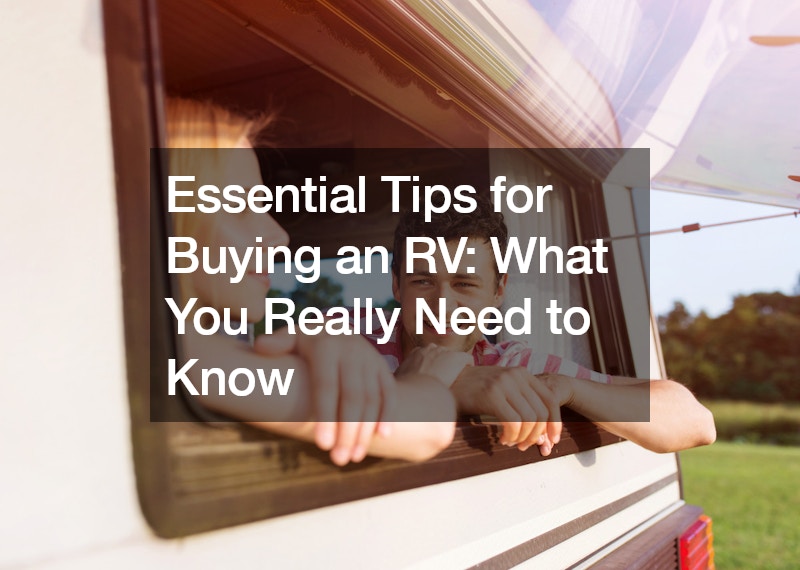Buying an RV is an exciting endeavor, offering the freedom to explore the open road and create unforgettable adventures. However, with so many options available, it’s essential to focus on what truly matters when making this significant investment. Here are some crucial tips to consider before purchasing your dream RV.
Firstly, let’s address the misconception surrounding RV length. Many potential buyers worry about whether their chosen RV will fit into national and state parks.
However, the truth is that most parks can accommodate various lengths of RVs. Whether your RV is 12 feet or 42 feet long, you’ll likely find suitable parking in the majority of campgrounds. The focus should instead be on other factors, such as amenities, storage space, and overall layout, rather than solely on length. Remember, the length of your RV shouldn’t be the determining factor in your decision-making process.
Another aspect to consider is the sleeping capacity of the RV. While it’s tempting to opt for an RV that can accommodate numerous guests, it’s essential to evaluate your actual needs. Pull-out couches may seem like a convenient solution for hosting guests, but they often come at the expense of valuable storage space. Instead of prioritizing occasional guests, focus on selecting an RV that meets the needs of your immediate family or travel companions. Additionally, consider alternative accommodations for guests, such as nearby cabins or RV storage units, rather than sacrificing comfort and functionality within your own space.
When researching potential RVs, it’s crucial to pay attention to the information provided on manufacturer websites. While figures like MSRP and unloaded vehicle weight may catch your eye, they don’t always accurately represent the true cost or weight of the RV. Instead, focus on more meaningful numbers, such as cargo carrying capacity and gross vehicle weight rating. These figures will give you a better understanding of how much gear and supplies you can bring along on your adventures without exceeding weight limits. Additionally, consider visiting RV storage units to get a sense of the space you’ll have available for storing belongings when not on the road.
As you browse through different RV models, you may come across various features and amenities designed to enhance your camping experience. However, it’s essential to distinguish between essential features and non-essentials. Items like sink and stove covers, electric fireplaces, and high-end furniture may seem appealing, but they often come with trade-offs. For example, sink and stove covers may provide additional prep space but can limit functionality when cooking. Similarly, electric fireplaces may add warmth and ambiance to your RV but can take up valuable storage space. Consider whether these features align with your priorities and lifestyle before making your decision.
Furthermore, don’t be swayed by pre-installed gadgets and amenities offered by manufacturers. While features like exterior speakers, smart TVs, and Wi-Fi systems may seem convenient, they can often be easily added or upgraded later on. Instead of paying extra for these pre-installed features, focus on selecting an RV that meets your basic needs and allows for future customization. For example, rather than relying on the built-in Wi-Fi system, consider investing in a portable hotspot that offers greater flexibility and choice in service providers.
Additionally, consider the maintenance and upkeep costs associated with owning an RV. Beyond the initial purchase price, you’ll need to budget for regular maintenance, repairs, insurance, and campground fees. It’s essential to factor these expenses into your overall budget and ensure that you can afford to keep your RV in good condition for years to come. Additionally, think about whether you have the time and resources to maintain your RV properly or if you’ll need to outsource certain tasks to professionals.
Finally, take the time to thoroughly inspect any RV you’re considering purchasing. Look for signs of wear and tear, water damage, and mechanical issues. Test all appliances, systems, and features to ensure they’re in working order. If possible, take the RV for a test drive to assess its handling and performance on the road. Don’t hesitate to ask questions and seek clarification from the seller or dealer about any concerns you may have.
In conclusion, purchasing an RV is a significant investment that requires careful consideration of your needs, priorities, and budget. By focusing on essential factors such as layout, amenities, functionality, and maintenance costs, you can make an informed decision and find the perfect RV for your lifestyle and travel goals. Remember to prioritize what truly matters and avoid getting caught up in unnecessary features or gimmicks. With the right approach and thorough research, you’ll be well-equipped to embark on your next adventure and create lasting memories on the open road.
.


